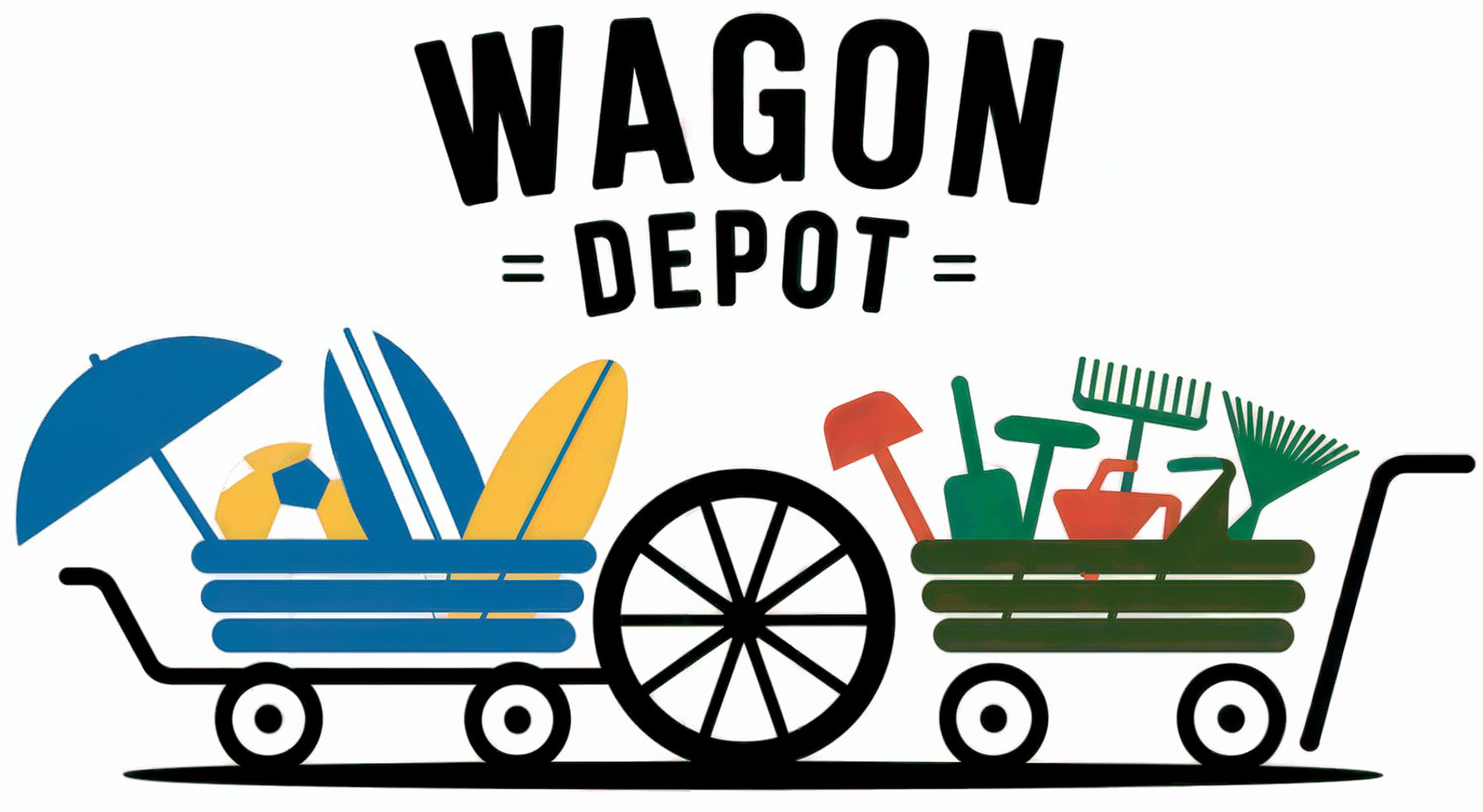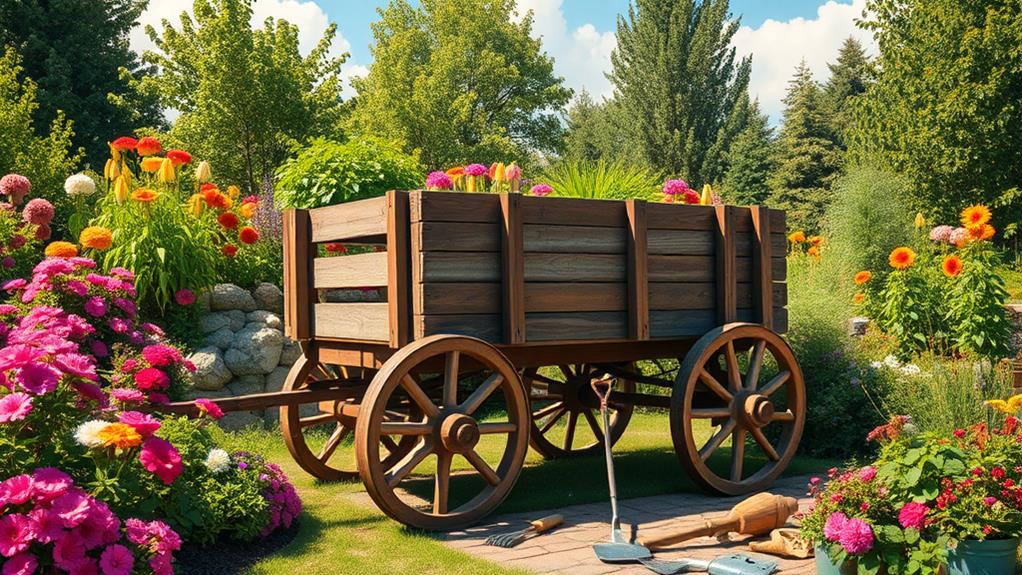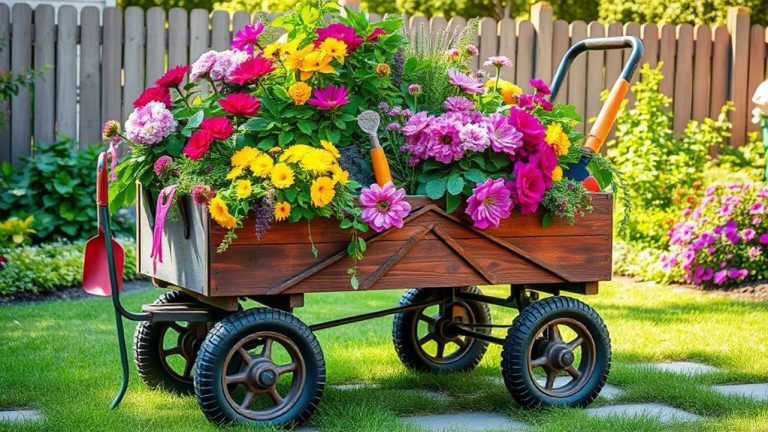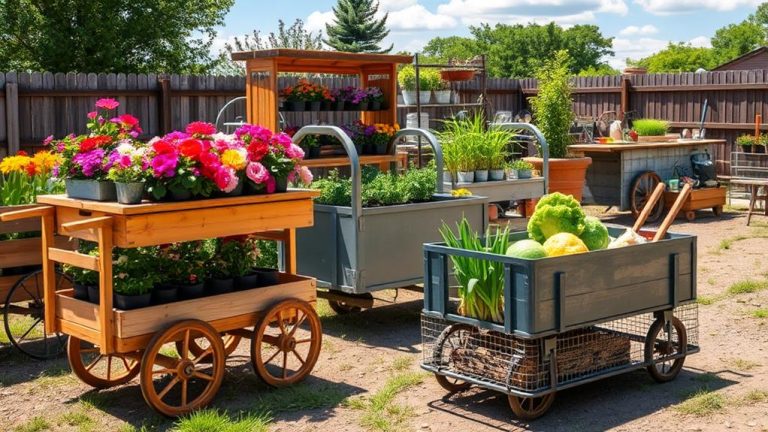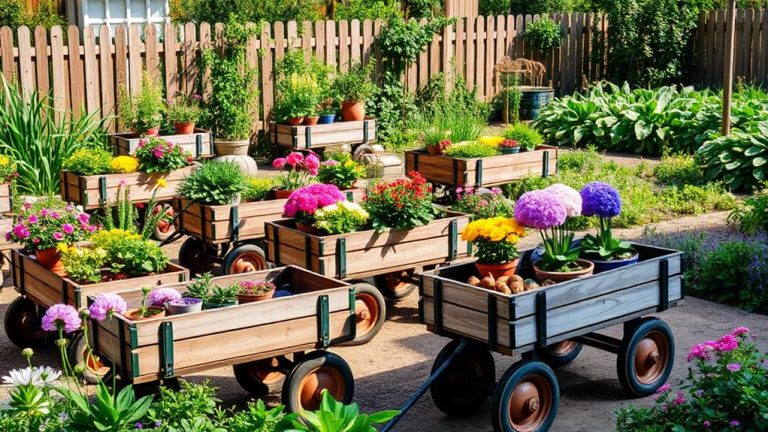When choosing a massive garden hauling wagon, start by evaluating your garden size and terrain. Larger areas and uneven ground require sturdier wagons with robust wheels. Next, check the weight capacity to guarantee it can handle your planned load without tipping. Wheel design matters too; pneumatic wheels are best for rough terrain, whereas solid rubber works on flat surfaces. Examine material durability—steel is strong but may rust, while aluminum resists corrosion. Finally, look for extra features like ergonomic handles and removable sides for convenience. You'll find that each of these tips can notably improve your hauling efficiency.
Assess Your Garden Size
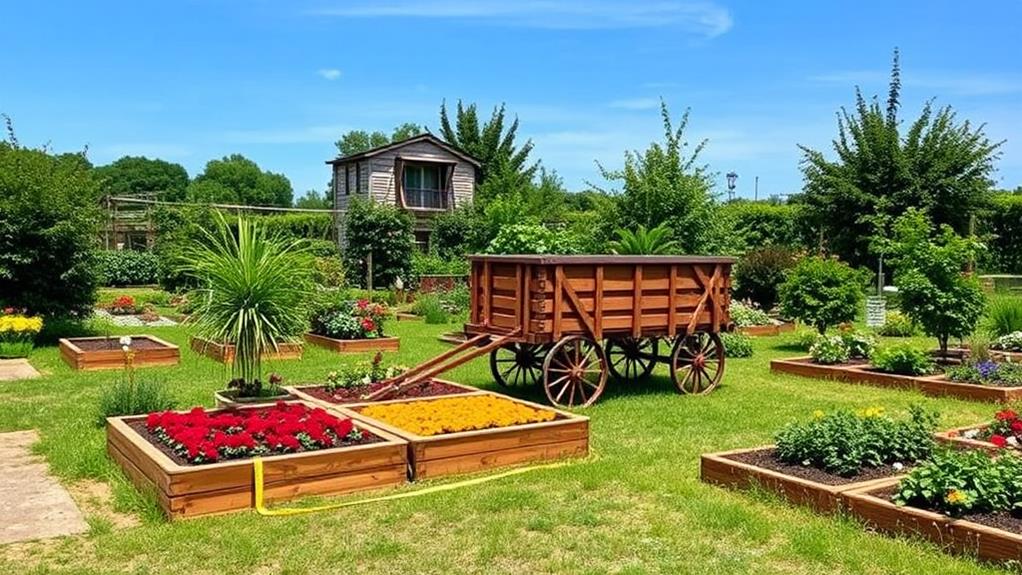
When you're choosing a garden hauling wagon, it is crucial to assess your garden size first, as this will influence the type and capacity of the wagon you need. Start by examining your garden layout. Is it sprawling with wide-open spaces, or is it more compact and intricate? If you've got a larger area, you might want a wagon that can carry more weight and bulk. Conversely, if your garden's smaller, a lightweight option could be more maneuverable and easier to store.
Next, consider the terrain type. Is your garden flat, or does it have hills and uneven ground? If you're working with rough terrain, opt for a wagon with sturdy wheels and a robust frame to handle the bumps. A wagon with a higher clearance will additionally help navigate obstacles without getting stuck.
Consider Weight Capacity
After evaluating your garden size and layout, it's important to contemplate the weight capacity of the hauling wagon. You want to guarantee that it can handle the load you plan to carry, whether it's soil, plants, or tools. Each wagon has a specified weight limit, and exceeding that can lead to damage or unsafe handling.
Consider how you'll be distributing the load. A well-balanced load is essential for maintaining stability and preventing tipping, especially when maneuvering uneven terrain. Make sure to arrange heavier items toward the bottom and center of the wagon for ideal load distribution.
Additionally, think about hitch compatibility if you plan to tow the wagon behind a vehicle or lawn tractor. Not all wagons are designed to be towed, so verify that the weight capacity aligns with both the wagon and your towing equipment. A mismatch can lead to unnecessary strain and safety risks.
Ultimately, choosing the right weight capacity guarantees that your hauling wagon fulfills your gardening needs while promoting a seamless and enjoyable gardening experience.
Evaluate Wheel Design
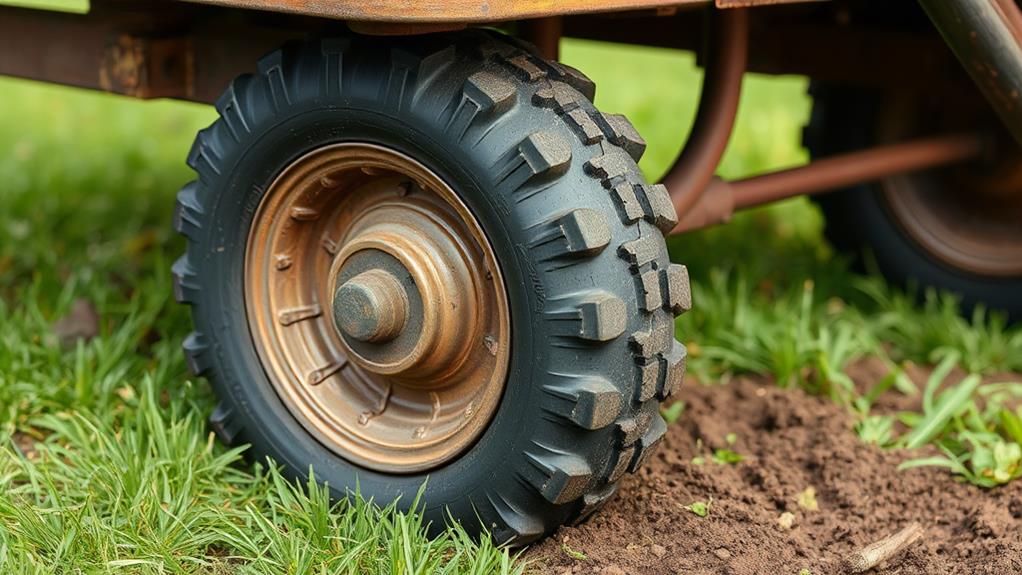
Choosing the right wheel design can make or break your hauling experience. When evaluating wheel design, consider both wheel materials and wheel size. The materials used in the wheels play an essential role in their performance. For instance, pneumatic wheels are great for uneven terrain, offering a smooth ride, whereas solid rubber wheels are durable and maintenance-free. Think about where you'll be using your wagon most—if it's often on rough paths, pneumatic wheels could be your best bet.
Next, look at wheel size. Larger wheels can tackle obstacles more easily and provide better maneuverability over uneven ground. If you plan on hauling heavy loads or maneuvering through garden beds, larger wheels can help distribute weight more effectively, reducing strain on both you and the wagon. Smaller wheels, conversely, might be more suitable for flat, paved areas where speed and ease of storage are priorities.
Ultimately, finding the right combination of wheel materials and wheel size customized to your specific needs will improve your freedom to roam around your garden without hassle. So, take your time and choose wisely!
Check Material Durability
Wheel design sets the stage for your wagon's performance, but the materials used in its construction play an essential role in its overall durability. When you're checking material durability, consider the various material types that can affect how well your wagon withstands wear and tear.
Here are some key factors to keep in mind:
- Steel frames offer strength but can rust if not treated properly.
- Aluminum is lightweight and resistant to corrosion, making it an excellent option for frequent use.
- Plastic components can be lightweight and affordable, but they may crack under heavy loads.
- Wooden decks provide a classic look, but they require regular maintenance to prevent rot.
- Tires made of high-quality rubber guarantee better traction on various terrains.
To keep your wagon in top shape, follow these maintenance tips: regularly check for rust and clean metal surfaces, inspect wheels for wear, and store it in a sheltered area. By choosing the right materials and committing to upkeep, your garden hauling wagon will serve you well for years, allowing you the freedom to transport your gardening supplies effortlessly.
Look for Additional Features
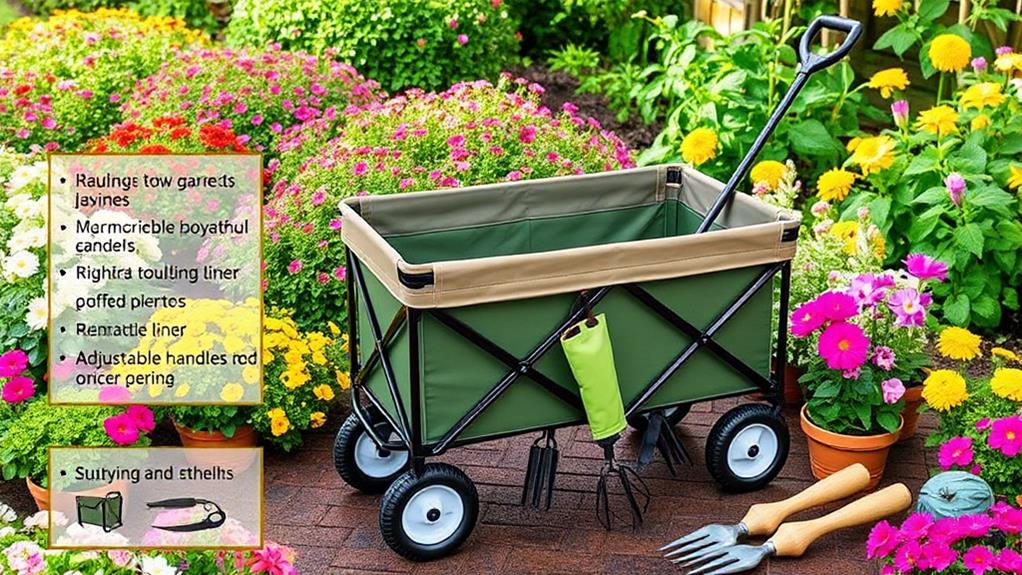
When selecting a garden hauling wagon, it's important to reflect on additional features that can improve its functionality and ease of use. You'll want to look for ergonomic handles that reduce strain during transportation, allowing you to maneuver the wagon comfortably. A folding design is another feature to take into account; it enables easy storage and transport, making it convenient for those with limited space.
Here's a table summarizing some crucial features to seek:
| Feature | Benefits | Considerations |
|---|---|---|
| Ergonomic Handles | Reduces strain and boosts grip | Check for comfort and height |
| Folding Design | Easy storage and portability | Verify it locks securely |
| All-Terrain Wheels | Smooth movement on various surfaces | Look for durable materials |
| Removable Sides | Versatile hauling options | Assess ease of removal |
| Waterproof Liner | Protects from spills and dirt | Confirm the liner's durability |
Frequently Asked Questions
What Is the Average Lifespan of a Garden Hauling Wagon?
When you think about a garden hauling wagon, it's like choosing a trusty steed for your outdoor adventures. The average lifespan of one can vary, but with heavy-duty materials, you're looking at around 5 to 10 years. If you treat it right, like keeping it clean and storing it properly, it could last even longer. So, invest in quality, and your garden wagon will serve you well through many seasons of hauling!
Can I Use a Garden Wagon for Other Purposes?
Absolutely, you can use a garden wagon for much more than just hauling plants! Its versatility makes it perfect for multi-purpose usage around your home. You could transport sports equipment, picnic supplies, or even tools for a DIY project. With a sturdy design and ample space, it's great for outdoor events or yard work. So, don't limit yourself—embrace the freedom of using your garden wagon for various tasks!
How Do I Maintain My Garden Hauling Wagon?
To maintain your garden hauling wagon, focus on regular wheel maintenance and rust prevention. Check the wheels for any debris and make sure they're properly inflated. Lubricate the axles to keep them running smoothly. To prevent rust, store your wagon in a dry place and consider applying a rust-resistant spray on metal parts. Regular cleaning after use will likewise help extend its lifespan, letting you enjoy your gardening freedom without worry!
Are There Eco-Friendly Options Available for Garden Wagons?
Absolutely, there are eco-friendly options available for garden wagons! Look for models made from sustainable materials like bamboo or recycled plastics. These materials not only decrease environmental impact but also guarantee durability. A lightweight design is another key feature, making it easier for you to maneuver and transport your plants. By choosing an eco-friendly garden wagon, you’re not just enhancing your gardening experience; you’re likewise contributing to a healthier planet. Additionally, some eco-friendly wagons come with removable liners or foldable designs for easy storage, adding to their practicality. When selecting the best garden wagon for plants, consider models with sturdy, all-terrain wheels to navigate various surfaces effortlessly. Investing in a sustainable garden wagon ensures long-term usability while supporting environmentally responsible choices.
Where Can I Find Replacement Parts for My Wagon?
If you're looking for replacement parts for your wagon, there are several reliable sources you can explore. Check online retailers like Amazon or specialized garden supply websites for a variety of parts. Local hardware stores might furthermore carry necessities. Moreover, don't forget to look for wagon repair tips available in forums or DIY websites; they can guide you through the process of installing parts and keeping your wagon in top shape for future adventures.
